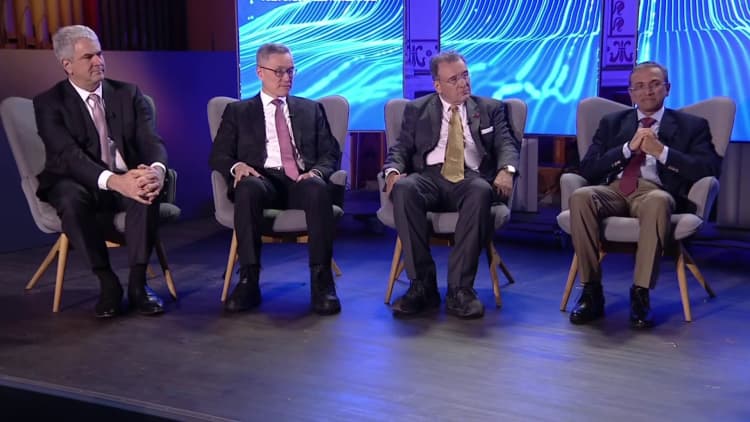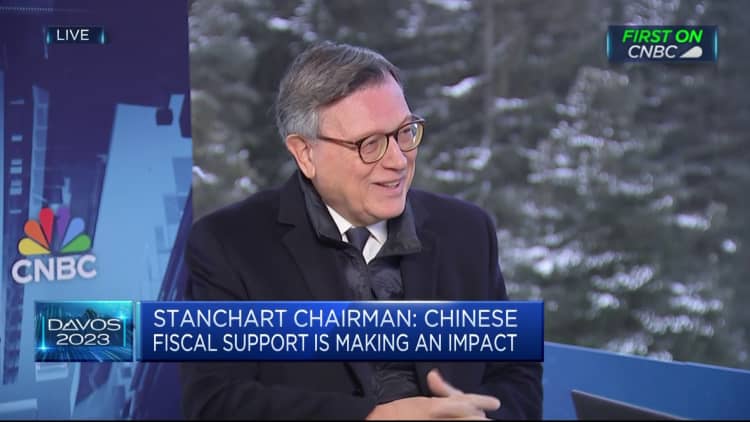[ad_1]
China’s reopening has been one of the most discussed topics at the World Economic Forum in Davos.
Bloomberg | Bloomberg | Getty Images
DAVOS, Switzerland — China’s economic reopening might boost global growth, but the business leaders and policymakers at the World Economic Forum this week are also a little anxious on its potential inflationary impact.
China’s decision to welcome tourists again as well as to make it easier for those in the country to travel abroad has been one of the most discussed topics at the Davos gathering in the Swiss Alps.
Overall, this is seen as one of the most important economic events in 2023 and the business community is noticeably excited about making new deals with the world’s second-largest economy.
On the other hand, however, there are concerns about what this means for inflation and the cost of living.
“[If] Chinese demand for other goods starts picking up, if that creates a bigger pressure on commodity prices, for example, natural gas, big issue in Europe, if Chinese natural gas demand increases, because the factories, their households demand more electricity, then it’s going to put pressure on Europe because natural gas, they’re competing [in] the same markets for liquid natural gas,” Raghuram Rajan, former central bank governor of the Reserve Bank of India, told CNBC.
“So China’s opening [is] good news overall, but potentially, the inflationary impact — there could be some,” he said.

The International Energy Agency has warned that European companies might face higher costs when looking to purchase natural gas this year as there will be more competition for the commodity. Inflation has been one of the biggest challenges for European citizens for the last year, mostly driven by higher energy bills.
Speaking on a CNBC-moderated panel, Satish Shankar, managing partner for APAC at consultancy Bain & Company, said: “I think China’s opening will therefore increase consumption in global energy, it could cause some inflation.”
Felix Sutter, president of the Swiss-Chinese Chamber of Commerce said at the same panel that “Chinese energy needs and raw material needs will compete with the European needs, the global needs, so I see inflation relaxation right now, [but] we will see more pressure on inflation in Q3.”
Some economists have warned that if this proves to be the case, then the U.S. Federal Reserve might have to keep raising rates further. “In our view … a stronger China increases the chances of a stubbornly hawkish Fed,” Tavis McCourt, institutional equity strategist at Raymond James, said in his 2023 outlook.
“With China, we do need more of everything — if that drives enough demand to get commodity prices back up closer to where they were in the spring of last year, then that puts the progress we’ve seen on inflation in a much more tenuous position,” he said.

China recently reported a growth rate of 3% for 2022, its second-slowest growth rate since 1976. Nonetheless, shorter-term data has boosted expectations of a better-than-expected recovery with December retail sales and industrial production above consensus.
Standard Chartered Chairman José Viñals told CNBC in Davos this week that China is going to have a very good year and surprise on the upside.
“The Chinese economy is going to be on fire and that’s going to be very, very important for the rest of the world,” he said.
Meanwhile, Rio Tinto’s CEO Jakob Stausholm also sounded positive about China’s economy and its natural impact on global growth, telling CNBC in Davos that he was “absolutely convinced” that China’s reopening will help the global economy.
— CNBC’s Arjun Kharpal and Jihye Lee contributed to this article.
[ad_2]
Source link
